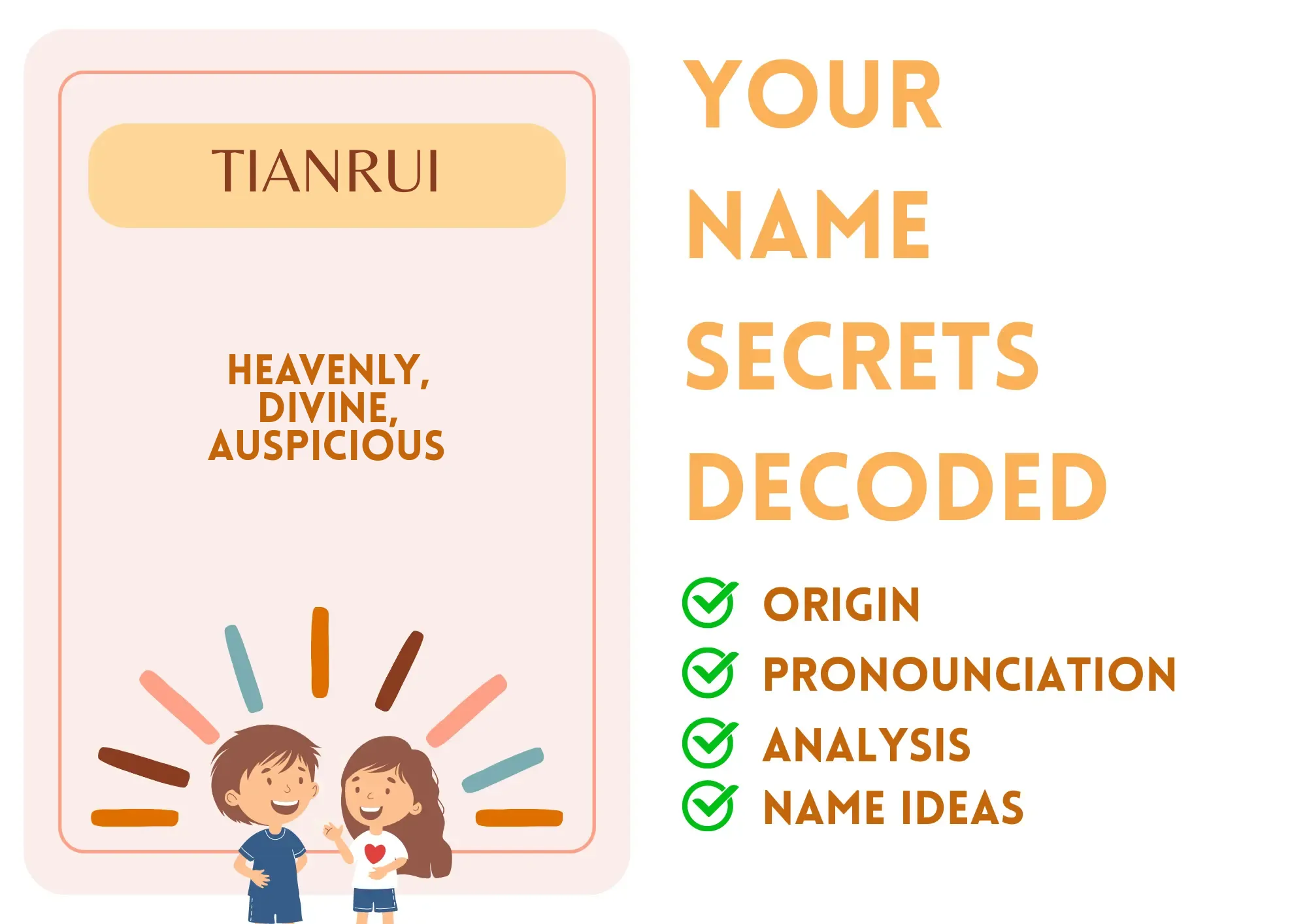
Tianrui
Tianrui is a poetic and meaningful name of Chinese origin, translating to 'heavenly' or 'divine' (天, Tian) combined with 'like' or 'wisdom' (瑞, Rui). It is commonly used in China and signifies auspiciousness and divine blessing. While primarily a masculine name, it can also be unisex.
In Chinese culture, the name Tianrui symbolizes prosperity and good fortune, often associated with the blessings of heaven. Historically, it has been favored by families who wish to invoke positive energy and success in their children's futures.
People perceive the name Tianrui as elegant and culturally rich. It is relatively easy to write and pronounce for those familiar with Chinese characters. Common nicknames might include Tian or Rui.
Tianrui is occasionally referenced in contemporary literature and narratives that celebrate cultural heritage and wisdom, making it a cherished name among parents favoring meaningful names.
Basic Information
Gender: Unisex
Sounds Like: TEE-ahn-rway
Pronunciation Explanation: The name is pronounced with emphasis on the first syllable 'TEE,' followed by 'ahn' which is softer, and ending with 'rway.'
Summary and Meaning
Meaning: heavenly, divine, auspicious
Origin: The name Tianrui has Chinese origins, deeply rooted in the Chinese language and culture.
Usage: Tianrui is traditionally a masculine name, but it can also be used for females, making it unisex.
Name Number (Chaldean)
Name Number (Pythagorean)
Popularity (Global Rank)
Overall: 122934
Boys: 54235
Girls:
Most Popular in
Religious and Cultural Significance
Religion: Buddhism
Background: In Chinese culture, Tianrui may carry connotations associated with Buddhist beliefs of auspiciousness and spiritual wisdom.
Cultural Significance: Tianrui captures the essence of Chinese philosophy where names are believed to influence one's destiny and embody blessings from above.
Historical Significance: Historically, names like Tianrui have been given to children with the hope that they would embody divine attributes and achieve greatness in life, reflecting cultural beliefs in the influence of names.
Popular Culture
Literature and Mythology: While there may not be popular literary references directly named Tianrui, names conveying similar meanings often appear in traditional Chinese myths and stories highlighting virtues and wisdom.
Movies and Television: Characters named Tianrui might appear in various Chinese dramas or films that emphasize themes of fate, fortune, and personal growth.
Feelings and Perceptions
Perception: Tianrui is generally perceived positively. It evokes feelings of elegance, prosperity, and a deep connection to Chinese culture and philosophy.
Positive Feelings: Elegant, auspicious, wise, culturally significant, hopeful, blessed.
Negative Feelings: Could be considered obscure outside of Chinese-speaking areas, potentially challenging to pronounce for non-native speakers.
Practical Considerations
Ease of Writing and Calling: Tianrui is moderately easy to write and pronounce, especially for those familiar with Mandarin sounds. It consists of six letters and three syllables, which can be easy to call once learned.
Common Typos and Misspellings: Tianry,Tianruii,Tianru,Tiarui
Common Nicknames: Tian,Rui
Tianrui Popularity
Tianrui Usage and Popularity By Country
| Country | Rank (Overall) |
|---|---|
| Singapore | 14796 |
| Panama | 16664 |
| Switzerland | 35738 |
| United States | 42113 |
| Australia | 42971 |
| Canada | 46968 |
| United Kingdom | 64637 |
Tianrui Usage and Popularity By City
| City | Rank (Overall) |
|---|---|
| Columbus | 4455 |
| New York | 27841 |
| Peking | 5417 |
| Shanghai | 8799 |
| Washington | 18644 |
| Berkeley | 2256 |
| Toronto | 27251 |
| Durham | 2807 |
| New York | 52406 |
| Philadelphia | 18057 |
Compatibility Analysis
Famous Persons Named Tianrui
-
Tianrui Li
Born: June 14, 1969 - Putian
Related Names
Similar Sounding Names:
Tianyu,Tiandi,Tianli